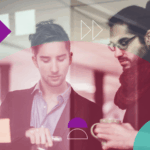By Richard Robinson (Director, Econsultancy) and Ashley Friedlein (Founder, Econsultancy)
In 2020, we experienced the “Great Shock,” the overnight switchover to remote working for all. It delivered complete change, and the focus for many was to follow the lead of Dory in ‘Finding Nemo’ and just keep swimming, learning and adapting in real-time to new ways of working while swimming hard to stay in the same place. What we learnt surprised many, most especially the leaders of several of the largest legacy companies; namely, you can move fast when you really have to, delivering digital transformation to meet the needs of the 168-hour a week economy.
Last year came the “Great Reflection,” accepting our ways of working while formulating the biggest questions to be effective. Do we need to change our business model? How will we iterate or innovate our operating model? Will we need to change how we go to market? Will things go back to how they were, and if they will should we wait it out?
This was a sober reflection on what ‘this’ — our new world — is for the long term. And today, of course, many are talking up the “Great Resignation,” fuelling the paradigm that people are tired of doing the same job in the same way and with the same benefits as before ‘this’ happened.
We know the game has evolved, the rules have changed and in the prophetic words of the Notorious B.I.G: “Things done changed on this side. They used to thump, but now they blast, right?”
These words should ring loudly for us all because 2022 heralds the “Great Reset,” where digital, marketing and eCommerce must recognise what’s changed for good, what needs to be embraced and what needs to transform if brands are to move from good to elite to deliver the needs of the customer.
Three ‘new normals,’ or maybe these could be better referred to as new app-normals, stand out for the year ahead. Hybrid is here to stay, Connections will become more direct, and Brands must champion a culture of ‘always be learning’ to win the war for talent.
Hybrid is Here to Stay
And yet, there is no standard definition of what hybrid means. The biological term for the offspring of two plants or animals, a thing made by combining two different elements, has become the corporate flag of convenience to encourage many to work it out and report back when they know what the answer is.
Of course, some love to work remotely; some want to be in the office. Some jobs require one or the other. But by far the majority, and this applies to marketing and digital, expect, and want, to work in a hybrid — or flexible — manner combining some form of remote and in person.
The Economist’s “World Ahead” study reported that pre-pandemic 5% of work was delivered remotely in the USA, with 27% of employers offering ‘flexible’ hours; this has risen dramatically to 40% and 88%, respectively. Employees are demanding employers provide flexible working whether they plan to use it or not. In digital, marketing and eCommerce, it’s a candidate’s market. In whatever form it comes, hybrid working is now table stakes to attract and retain the best talent.
Connections Will Become More Direct
Arguably, this is a continuation of a trend already underway and expressed through the pushback against ‘Big Tech,’ a desire for more privacy and protection, a quest for authenticity and meaning, and a rejection of sometimes toxic and overwhelming traditional social media. However, Covid has indeed accelerated this. In an atmosphere of alienation and uncertainty, we see people seeking community, empathy, and trust through more authentic, meaningful, and direct connections.
There is a clear shift to first-party data and known digital identities, with 100% of brands recently interviewed by Econsultancy already using or considering using it in 2022 (72% and 28% respectively), a true renaissance of community and the birth of CBM (Community Based Marketing), the use of ‘closer’ eCommerce environments and Walled Gardens such as Walmart, Carrefour, EPIC and Disney Drax, as well as niche marketplaces like Instacart, Goat and Vacasa. They are taking more than a bite out of Amazon, Etsy and AirBnB. And finally, DTC, where older brands are transforming to take on upstarts born in digital, with L’Oreal leading the charge with close to 30% of its sales now coming via eCommerce.
Always be learning
The romantic days of McCall, Lombardo & Eichinger’s 70:20:10 model where they asked 200 executives to self-report how they learned and found 70% of learning came on the job, 20% from a manager and 10% in more formalised training programmes are now long gone.
Despite the model only being created as recently as 1996, the advent of digital commerce and experience means that to succeed digital, marketing & eCommerce professionals need to learn at the speed of need, with a mindset to ‘always be learning’ 100% of the time if they want to stay one step ahead of the customer.
As brands and businesses reset for 2022, marketers need to reset the paradigm of learning and prepare to learn their way out of the pandemic, gaining a new guard of skills in data and analytics, agility and adaptability, innovation and experimentation, real-time customer-centricity and long term effectiveness.
The Great Reset will be remembered not by its initial calling card of ‘the great resignation’ but by the long-term shift in leaders prioritising learning and sparking the infinite power of the great retention.
About the Author
Richard Robinson is Director of Econsultancy and specialises in accelerating marketing performance and digital transformation.
Richard has worked internationally with The Coca-Cola Company, domestically with McDonald’s restaurants, heading Adult and Family Marketing, and before Econsultancy was one of the four equity partners of Oystercatchers. In addition to working in brand marketing, Richard has worked for Publicis Worldwide, where he led the agency’s P&G business in EMEA for several years while running Publicis Groupe’s African expansion in parallel.






